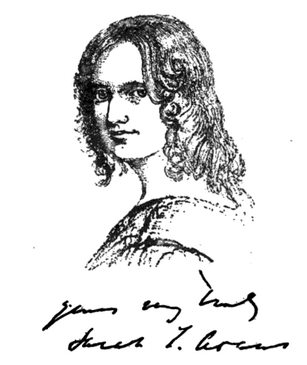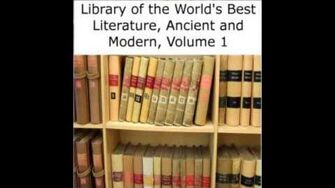
Sarah Fuller Flower Adams (1805-1848), by Margaret Gillies (1803-1887), 1834, from Studies of Familiar Hymns, 1903. Courtesy Wikimedia Commons.
Sarah Fuller Flower Adams (22 February 1805 - 14 August 1848) was an English poet and hymnist.
Life[]
She was born Sarah Fuller Flower, was born at Harlow, in Essex, on 22 February, 1805. She was the younger sister of Eliza Flower, who was a gifted musician and composer. Eliza and Sarah were the only children of Benjamin Flower, a a printer at Cambridge and afterwards editor of the Cambridge Intelligencer, a paper in which he advocated liberal principles and dared free criticism, for which he suffered fine and imprisonment.[1]
Adams, daughter of Benjamin and sister of Eliza Flower , was born at Great Harlow, Essex, 22 February 1805.[2]
Mrs. Flower died in 1810. In 1820 the family removed to Dalston, London, then a rural spot, where their friends included Harriet Martineau and Robert Browning.[1]
After the death of her father in 1827 Flower lived with the family of poet William Johnson Fox, and became a contributor to the Monthly Repository, then edited by him.[2] On 24 September 1834, she was married at St. John’s, Hackney, to Mr. John Brydges Adams,[3] the “Junius Redivivus” of the Repository.[1]
Wanting to be an actress, she made her public debut in 1837, appearing at the little Richmond theatre as Lady Macbeth with considerable success. Portia and Lady Teazle were to follow. Her success resulted in a good engagement for the Bath Theatre, then considered the best training school for aspirants for the London Stage, obtained partly, no doubt, by a flattering introduction from Macready, who thought highly of her powers. But her health gave way, and finding herself physically incapable of sustaining the strain of public performances, she determined to devote her efforts entirely to literature.[1]
Her principal work, Vivia Perpetua: A dramatic poem, was published in 1841. She also authored numerous contributions to the Monthly Repository, chiefly in the years 1834 and 1835, and a long poem in Ballad meter, entitled "The Royal Progress," on the surrender of the sovereignty of the Isle of Wight to Edward I by Isabella, Countess of Albemarle, which appeared in the Illuminated Magazine for 1845.[2]
She also composed several hymns, set to music by her sister, and used in the services at Finsbury Chapel; numerous unpublished poems on social and political subjects, principally written for the Anti-Corn Law League, specimens of which will be found in the 4th volume of Fox's ‘Lectures to the Working Classes;’ and a little religious catechism entitled The Flock at the Fountain.[2]
All who knew Mrs. Adams personally speak of her with enthusiasm; she is described as a woman of singular beauty and attractiveness, delicate and truly feminine, high-minded, and in her days of health playful and high-spirited. She died of in August 1848. She left no descendants.[2]
Writing[]
Although Mrs. Adams was endowed with so much dramatic talent as to have meditated adopting the stage as a profession, the bent of her literary genius was rather lyrical than dramatic. Vivia Perpetua, only moderately interesting as a play, is couched throughout in a fine strain of impassioned emotion, symbolizing, in the guise of Vivia's conversion to Christianity, the authoress's own devotion to the high ideals which inspired her life. This truth of feeling redeems Mrs. Adams's eloquence from the imputation of rhetoric, and, notwithstanding the artlessness of the construction and the conventionality of the stage accessories, renders her work genuinely impressive. Vivia's monologue on forswearing the altar of Jupiter is especially eloquent. The authoress, however, was more happily inspired in her hymns, which, as simple expressions of devotional feeling at once pure and passionate, can hardly be surpassed.[2]
Her hymn "Nearer to Thee" — often erroneously attributed to Harriet Beecher Stowe — is known wherever the English language is spoken; and the lines beginning "He sendeth sun, He sendeth shower" are even more exquisite in their blended spirit of fervor and resignation.
Recognition[]
There is a blue plaque to William and Sarah Adams in Loughton, Exxex.
In popular culture[]
Her hymn, “Nearer, my God, to Thee,” ranks among the most popular of modern hymns.[1] The hymn is also of historical significance as it is reputed to be the final piece played by 8 musicians on The RMS Titanic as it sank on April 14, 1912.[4]
Publications[]
Poetry[]
- Vivia Perpetua: A dramatic poem in five acts. London: Charles Fox, 1841.
- Nearer, My God, To Thee (illustrated by Frederick Warren Freer). New York: Stokes, 1887.[5]
Juvenile[]

"Nearer my God to Thee" -Sarah Flower Adams 1841

Selected Poems by Sarah Flower Adams
- The Flock at the Fountain. London: Palmer & Clayton, 1845.
Except where noted, bibliographical information courtesy WorldCat.[6]
See also[]
References[]
Garnett, Richard (1885) "Adams, Sarah Flower" in Stephen, Leslie Dictionary of National Biography 01 London: Smith, Elder, p. 101. Web, Dec. 27, 2019.
- H.W. Stephenson, The Author of Nearer, My God, to Thee, 1922
- H.W. Stephenson, Unitarian Hymn-Writers, 1931
Notes[]
- ↑ 1.0 1.1 1.2 1.3 1.4 Alfred H. Miles,, Critical & Biographical Essay: Sarah Flower Adams, Sacred Poets of the Nineteenth Century, London: Routledge / New York: Dutton, 1907. Web, Dec. 27, 2019.
- ↑ 2.0 2.1 2.2 2.3 2.4 2.5 Garnett, 101.
- ↑ Garnett, in his Dictionary of National Biography article on William Johnson Fox, gives Flower's husband's name as "William Bridges Adams."
- ↑ Titanic's Band, Titanic.com, Andrew Clarkson. Web, June 25, 2013.
- ↑ Nearer, my God, to Thee, Internet Archive. Web, Dec. 28, 2015.
- ↑ Sarah Flower Adams, WorldCat, OCLC Online Computer Library Center Inc. Web, Sep. 11, 2013.
External links[]
- Poems
- Adams, Sarah Flower (1805-1848) (1 poem) at Representative Poetry Online.
- Sarah Flower Adams in A Victorian Anthology: "Hymn," "Love," "Nearer to Thee"
- Index entry for Sarah (Fuller) Flower Adams at Poets' Corner
- Sarah Flower Adams at PoemHunter (6 poems)
- Sarah Flower Adams at Poetry Nook (8 poems)
- Sarah Flower Adams at Hymnary (29 hymns)
- Music
- Nearer My God to Thee sheet music
- Audio / video
- Sarah Flower Adams hymns at YouTube
- Books
- Sarah Flower Adams at Amazon.com
- About
This article incorporates text from a publication now in the public domain, the Dictionary of National Biography (edited by Leslie Stephen). London: Smith, Elder, 1885-1900. Original article is at: Adams, Sarah Flower
|